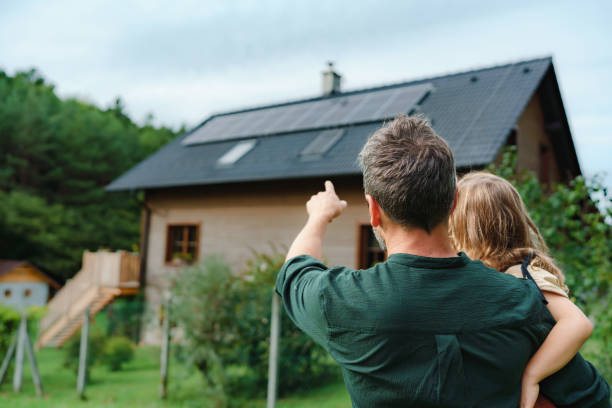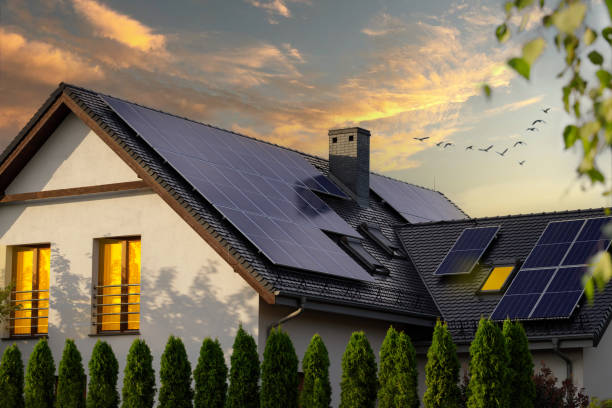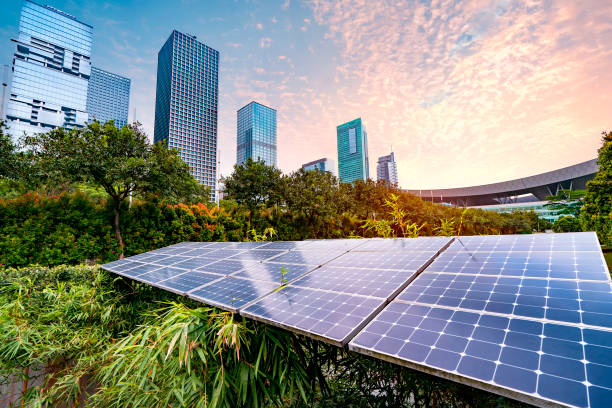The Benefits And Cost Savings Of Solar Power For Homes

Are you tired of skyrocketing electric bills and the constant dependence on the power grid? We've been there too, and we understand how frustrating it can be. Did you know that solar energy systems installed at homes can reduce your monthly electricity bill by up to 50%? In this blog post, we'll reveal all the fantastic benefits of installing a giant money-saving machine on your roof: a solar power system.
Dive into our guide; it's time to soak up some sun!
Key Takeaways
- Solar power systems installed in homes can reduce monthly electricity bills by up to 50%.
- Homeowners can experience a significant return on investment (ROI) with solar power systems, resulting in long-term savings and a more sustainable future.
- Government subsidies and incentives, such as tax credits and grants, are available to help make the installation of solar panels more affordable.
- Installing solar panels can increase the value of your home by up to 10%, attract potential buyers faster, and contribute to a positive ROI.
Understanding Solar Power for Homes
Solar power is a renewable energy source that harnesses the sun's energy to generate electricity for homes.
https://www.youtube.com/watch?v=k6veDQ6nWUQ
What is solar power?
Solar power harnesses the abundant energy from our sun, converting it into clean, renewable electricity for homes. This sustainable energy source stems from solar panels that capture sunlight and turn it into usable power.
With the continuous rise of sunlight availability each day, we can expect a steady supply of this green form of power. Solar panels reduce reliance on nonrenewable resources and decrease our carbon footprint significantly by limiting greenhouse gas emissions.
Understanding the essentials of solar power is key to progressively turning towards more eco-friendly living while still meeting our energy needs efficiently at home.
How does it work?
Solar panels on our rooftops absorb sunlight, brimming with renewable energy. This absorbed light is then converted into electricity by the photovoltaic cells in these panels. The created power can be used immediately to run household appliances and other electrical devices we use daily.
Any excess electricity not consumed by our homes doesn't go waste either! It feeds back into the grid via an electricity meter, earning us credits from power companies. This way, even during periods of low sunshine or high consumption, solar powers your home day and night without interruptions.
Benefits of solar power for homes

Opting for solar power in our homes can provide us with a multitude of benefits, each contributing to a sustainable living and cost-effective lifestyle.
- We get renewable energy every day from the sun, making solar power an endlessly replenishing source for our homes.
- Our carbon footprint decreases substantially when we utilise residential solar power; thus, we become active participants in fostering a greener planet.
- Solar panels can act as a dependable power outage backup ensuring that we never have to stumble in the dark during unexpected blackouts.
- The affordability of solar panels is on the rise, allowing more homeowners access to this sustainable energy source.
- Installing solar power systems can drastically lower our monthly electricity bills, making it a smart long-term investment.
- On top of financial savings and environmental contributions, the green energy generated by solar panels can significantly increase property value.
Cost Savings of Solar Power
With solar power for homes, homeowners can experience a significant reduction in their electricity bills, achieve a great return on investment (ROI), and take advantage of government subsidies and incentives.
https://www.youtube.com/watch?v=SHcTMxQ-JF0
Reduction in electricity bills
Installing solar panels for your home can lead to a significant reduction in electricity bills. Solar power systems harness the energy from the sun and convert it into usable electricity, which means you rely less on traditional power sources.
By generating your own clean and renewable energy, you can drastically lower or even eliminate your monthly electric bills. Over the span of 20 years, using solar panels has been shown to lower cumulative electricity costs by a substantial amount.
So, not only are you saving money in the long run, but you're also reducing your reliance on non-renewable resources and contributing to a more sustainable future.
Return on investment (ROI)

The return on investment (ROI) for solar power is an important consideration for homeowners. Over a period of 25 years, installing solar power systems can result in a total profit of $46,031 with an internal rate of return (IRR) of 18.64%.
Despite the initial cost, homeowners who invest in solar panels experience excellent returns. The payback period refers to the time it takes to earn back the initial investment through monthly energy savings.
Factors such as location and state can influence the ROI of solar panels, but they offer long-term savings and contribute to a positive ROI in the end.
Government subsidies and incentives
The government offers several subsidies and incentives to encourage homeowners to switch to solar power. These include:
- Federal solar tax credit: Homeowners can deduct 30% of the solar purchase and installation costs from their federal taxes, resulting in significant cost savings.
- State-level incentives: Many states offer additional tax credits and benefits for solar panel installation, further reducing the upfront costs.
- Renewable energy grants: Some governments provide grants or financial subsidies specifically for installing renewable energy systems like solar panels.
- Tax deductions: Homeowners may also be eligible for tax deductions on their property taxes for investing in renewable energy sources.
- Government support: The government actively supports the adoption of solar panels by offering programs and resources to assist homeowners with the installation process.
Increased Home Value

Solar power systems can significantly increase the value of your home, making it more attractive to potential buyers. Find out how in our latest blog post!
https://www.youtube.com/watch?v=xdJnvfj-dYs
Positive impact on property value

Installing solar panels on your home can have a positive impact on its property value. Studies have shown that homes with solar panels can increase in value by 3% to 10%. In fact, the National Renewable Energy Laboratory found that for every $1 invested in solar panels, home values increased by around $20.
The extent of the increase will depend on factors such as the size of your solar panel system and the local housing market. Not only do solar panels add value to your home, but they also enhance its aesthetic appeal.
By embracing green technology and sustainable living, you're attracting potential buyers who prioritize energy efficiency and eco-friendliness. So not only are you saving money on electricity bills and reducing your carbon footprint, but you're also making a smart investment in your home's future.
Attractiveness to potential buyers

Homes with solar panels have a unique appeal to potential buyers. Not only do they offer the benefits of renewable energy and cost savings, but they also contribute to increased home value.
Research shows that homes equipped with solar power systems can be up to 4% more valuable compared to similar homes without solar panels. This means that if you decide to sell your home in the future, having solar panels installed can help attract prospective buyers and potentially lead to a faster sale.
With the growing interest in green technology and sustainable living, having solar energy in your home makes it more appealing and aligns with market demand for environmentally conscious features.
Environmental Benefits

Solar power is not only good for your wallet, but also for the planet. It reduces carbon emissions and provides a renewable source of energy. Want to learn more about the environmental benefits of solar power for homes? Keep reading!
Reduced carbon emissions
Solar power for homes offers a significant advantage when it comes to reducing carbon emissions. By harnessing the energy from the sun, solar panels produce electricity without burning fossil fuels, which are major contributors to greenhouse gas emissions.
This means that using solar power helps mitigate climate change and its negative impacts on our environment. Solar energy is a clean and renewable source of power, making it an eco-friendly option for homeowners who want to reduce their carbon footprint and contribute to creating a more sustainable future.
Renewable energy source
Solar power is a renewable energy source that offers numerous benefits for homeowners. It's a clean and sustainable alternative to traditional fossil fuels, helping to minimize greenhouse gas emissions and reduce our reliance on non-renewable resources.
By harnessing the power of sunlight, solar panels generate clean electricity without polluting the environment or contributing to climate change. This eco-friendly power source not only provides an environmentally-conscious solution but also helps homeowners save on their electricity bills while reducing their carbon footprint.
Factors Affecting Solar Power Costs

Factors such as initial installation costs, maintenance and operational costs, and financing options can all affect the overall cost of solar power. To find out more about these factors and how they influence the affordability of solar power for your home, continue reading.
Initial installation costs
The initial cost of setting up a solar power system for your home can be quite high. This includes the expenses for purchasing solar panels, inverters, batteries, wiring, and the installation itself.
On average, residential solar installation costs range from $15,000 to $25,000. These costs can vary depending on factors like location, system size, and installation complexity. It's important to consider these upfront expenses when deciding to switch to solar power.
Maintenance and operational costs
Maintaining and operating solar power systems can come with some expenses. Professional servicing for solar panels typically costs between $140 to $180, and an annual inspection or cleaning may also incur additional charges.
While solar panels generally have low maintenance costs overall, it's important to note that repairs and ongoing maintenance can add up over the years. These costs should be considered when evaluating the overall financial benefits of installing solar power in your home.
Financing options
There are various financing options available for homeowners who want to invest in solar power systems. These options include personal loans, home equity financing, government loan programs, and contractor loans.
Homeowners have the flexibility to pay for their solar system with a home equity loan or through financing offered by installers, banks, credit unions, or finance companies. Incentives such as subsidies and incentives can help offset the initial costs of installing solar panels.
While there may be significant upfront expenses involved, these costs are often balanced out by the savings on electricity bills over time. Buying your own solar panels requires an investment and careful decision-making; however, owning your system in the long run has more benefits than costs associated with ownership.
Calculating Energy Production and Savings

To determine the energy production and savings of a solar power system for your home, evaluate your current energy needs, estimate the potential energy production from the panels, and calculate the resulting cost savings on your monthly electricity bills.
Evaluating energy needs
To fully understand the benefits and cost savings of solar power for your home, it is important to evaluate your energy needs. This involves assessing how much energy you currently consume and determining how much renewable energy you need to generate.
By analyzing your energy output and estimating consumption, you can determine the size of the solar power system that best suits your requirements. Additionally, considering the environmental impact of solar energy will ensure a more comprehensive evaluation.
Lastly, evaluating cost savings by calculating operation and maintenance costs, as well as potential electricity bill savings, will help you make an informed decision about adopting solar power for your home.
Estimating energy production
To determine how much energy your solar power system will produce, you need to estimate the amount of electricity it generates. This is measured in units called kilowatt-hours (kWh).
Factors such as the size and efficiency of your panels, the amount of sunlight in your area, and any shading or obstructions on your roof can affect the production of energy. By considering these factors and using tools like a solar power savings calculator, you can get an estimate of how much electricity your system will generate each month.
This information is crucial for understanding the potential cost savings and return on investment that solar power can provide for your home.
Determining cost savings
To determine the cost savings of installing a solar power system in your home, there are a few key factors to consider. First, you'll want to evaluate your energy needs by looking at your historical electricity usage.
This will help you estimate how much energy your solar panels will need to produce in order to offset your consumption and reduce your bills.
Next, it's important to estimate the energy production of the solar system you're considering. Factors such as panel efficiency and location can impact this, so it's worth consulting an expert or using a solar power savings calculator for more accurate estimates.
Finally, calculating cost savings involves looking at both upfront costs and long-term benefits. Determine the total installation cost of the system and compare it with potential savings on electricity bills over time.
You can also factor in government subsidies and incentives that may be available.
Considerations for Solar Panel Installation

When considering solar panel installation, it is important to assess the suitability of your roof and any space constraints that may affect the positioning and efficiency of the panels.
Additionally, consider the lifespan and maintenance requirements of solar panels, as well as factors like relocation and scalability if you plan on expanding your system in the future.
Roof suitability and space constraints
Solar panel installation on roofs requires careful consideration of roof suitability and space constraints. For optimal performance, solar panels need a flat and open space on the roof.
Any obstructions or inconsistencies on the roof surface may limit the size of the solar array that can be installed. Certain roof types, like flat roofs or those with limited space, may not be suitable for solar panel installation.
Space constraints also play a role in determining the number of solar panels that can be installed. The size of the roof and its orientation towards the sun are important factors to consider when determining if your home is suitable for solar panel installation.
Solar panel lifespan and maintenance
Solar panels have a lifespan of about 25 years on average, making them a reliable long-term investment for your home. These durable photovoltaic modules come with warranties that usually last between 15 to 25 years, giving you peace of mind.
The best part is that maintenance costs for solar panels are low compared to other energy systems. By regularly cleaning your solar panels, you can maximize their efficiency and ensure they continue to generate clean and green energy for many years to come.
With quality solar panels, you may even enjoy their benefits for up to 40 years or more.
Relocation and scalability
Solar panels offer homeowners the advantage of scalability and relocation. This means that if you decide to increase your solar power capacity in the future, you can easily add more panels to meet your energy needs.
Similarly, if you need to move to a new home, you can simply uninstall your solar panels and take them with you. This flexibility allows homeowners to adapt their solar power systems as their energy requirements change or when they relocate.
So whether you want to expand your clean energy production or move to a new location, solar panels provide a convenient and adaptable solution.
Challenges and Limitations of Solar Power
Despite its numerous benefits, solar power also has some challenges and limitations. These include the dependence on sunlight for energy production, the need for storage solutions to address intermittent power supply, and the environmental impacts of manufacturing and disposing of solar panels.
However, these challenges should not deter homeowners from considering solar power as a viable option for their homes. To learn more about how these limitations can be overcome and how solar power can still be a valuable investment, continue reading.
Dependence on sunlight
Solar power for homes is a great way to harness renewable energy and save on electricity bills. However, it's important to consider the dependence on sunlight when installing solar panels.
Solar power relies on consistent and sufficient sunlight for optimal performance. Factors such as geographic location, weather conditions, cloud cover, and shade can affect the amount of sunlight available.
In areas with limited sunlight or high levels of shading, the effectiveness of solar panels may be reduced. This means that in regions with long periods of darkness or limited sunlight, solar power may not be a practical or cost-effective option for homes.
Storage and grid integration
Storage plays a crucial role in ensuring that solar energy can contribute to the electricity supply even when the sun isn't shining. By storing excess energy during peak sunlight hours, it allows for the release of this energy when it's needed, such as during nighttime or cloudy days.
This helps homeowners with solar panels to have a reliable and consistent source of electricity throughout the day. Additionally, integrating distributed solar PV power into the grid not only reduces line losses but also enhances the overall resilience of the grid system.
The combination of solar power and storage systems even enables off-grid properties to generate and store their own electricity, thereby reducing their reliance on the grid.
Manufacturing and disposal impacts
Solar power may offer numerous benefits for homes, but it's important to consider the potential environmental impacts as well. The manufacturing process of solar panels can contribute to land use and habitat destruction, as well as water consumption.
Additionally, the production of solar panels involves the use of dangerous substances that can have negative effects on the environment. Disposal of solar panels at the end of their lifespan also poses challenges in terms of proper waste management.
It's crucial to be aware of these manufacturing and disposal impacts when considering solar power for your home.
Conclusion
In conclusion, installing solar power systems in homes offers numerous benefits and cost savings. Homeowners can enjoy reduced electricity bills, increased home values, and a positive impact on the environment.
With decreasing costs of solar systems and increasing electricity prices, now is the perfect time to invest in clean and sustainable energy for your home.
FAQs
1. What are the benefits of solar power for homes?
Solar power offers numerous benefits for homeowners, including reduced electricity bills, a sustainable and renewable energy source, increased property value, and the potential to earn money through feed-in tariffs.
2. How much can I save on my electricity bills with solar power?
The amount you can save on your electricity bills will depend on various factors such as the size of your solar panel system, your energy consumption patterns, and any government incentives or feed-in tariffs in your area. On average, homeowners can save anywhere from 50-70% on their electricity bills with solar panels.
3. What is a feed-in tariff and how does it work?
A feed-in tariff is a government incentive that allows homeowners to earn money by selling excess solar energy back to the grid. When your solar panels generate more electricity than you use, the surplus is fed into the grid for others to use, and you receive a payment or credit for this contribution.
4. How long does it take to recoup the cost of installing solar panels?
The payback period for installing solar panels varies depending on factors such as upfront costs, energy consumption levels, and available financial incentives. On average, homeowners can expect to recoup their investment within 5-10 years through savings on electricity bills and potential income from feed-in tariffs.










